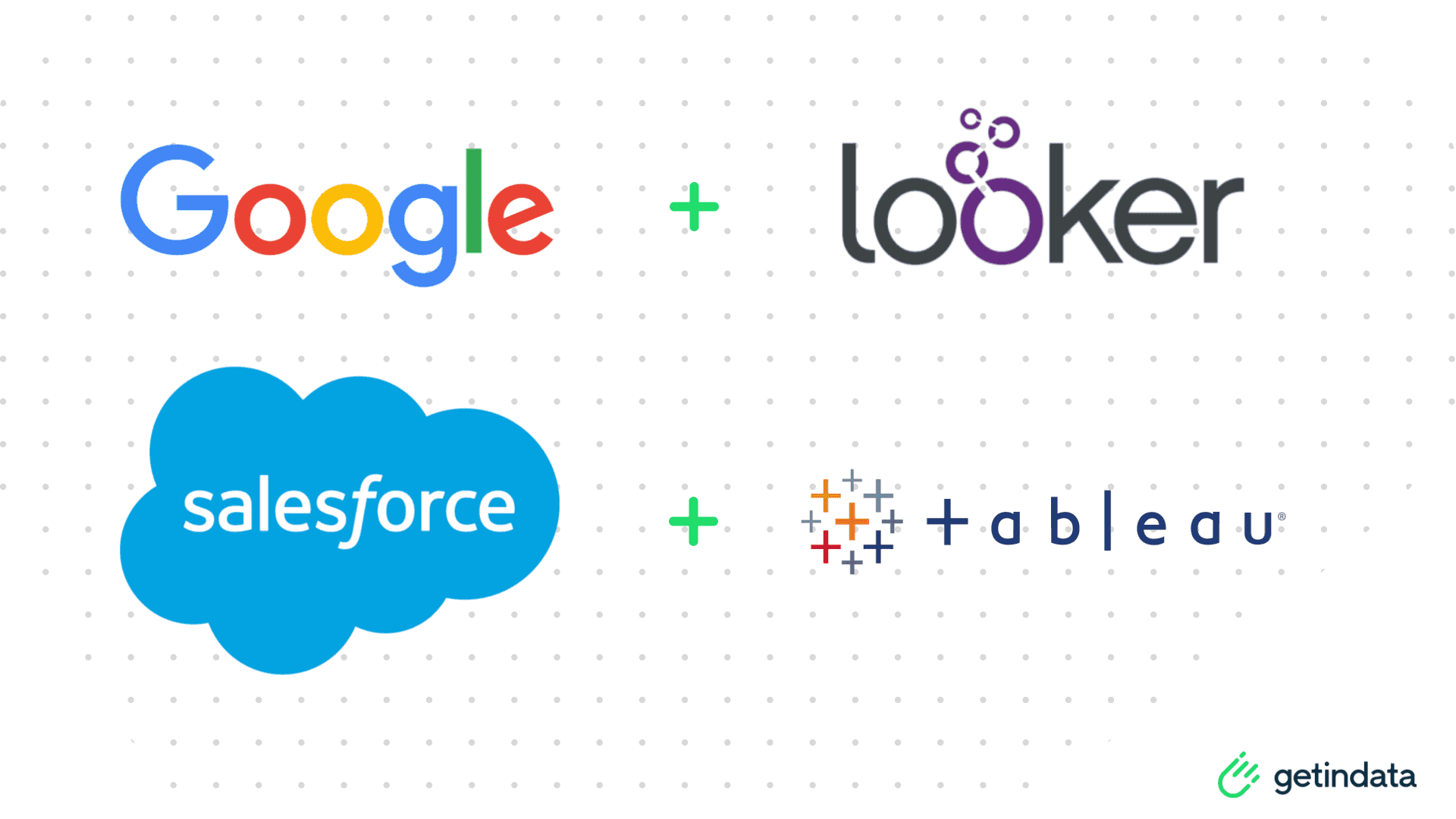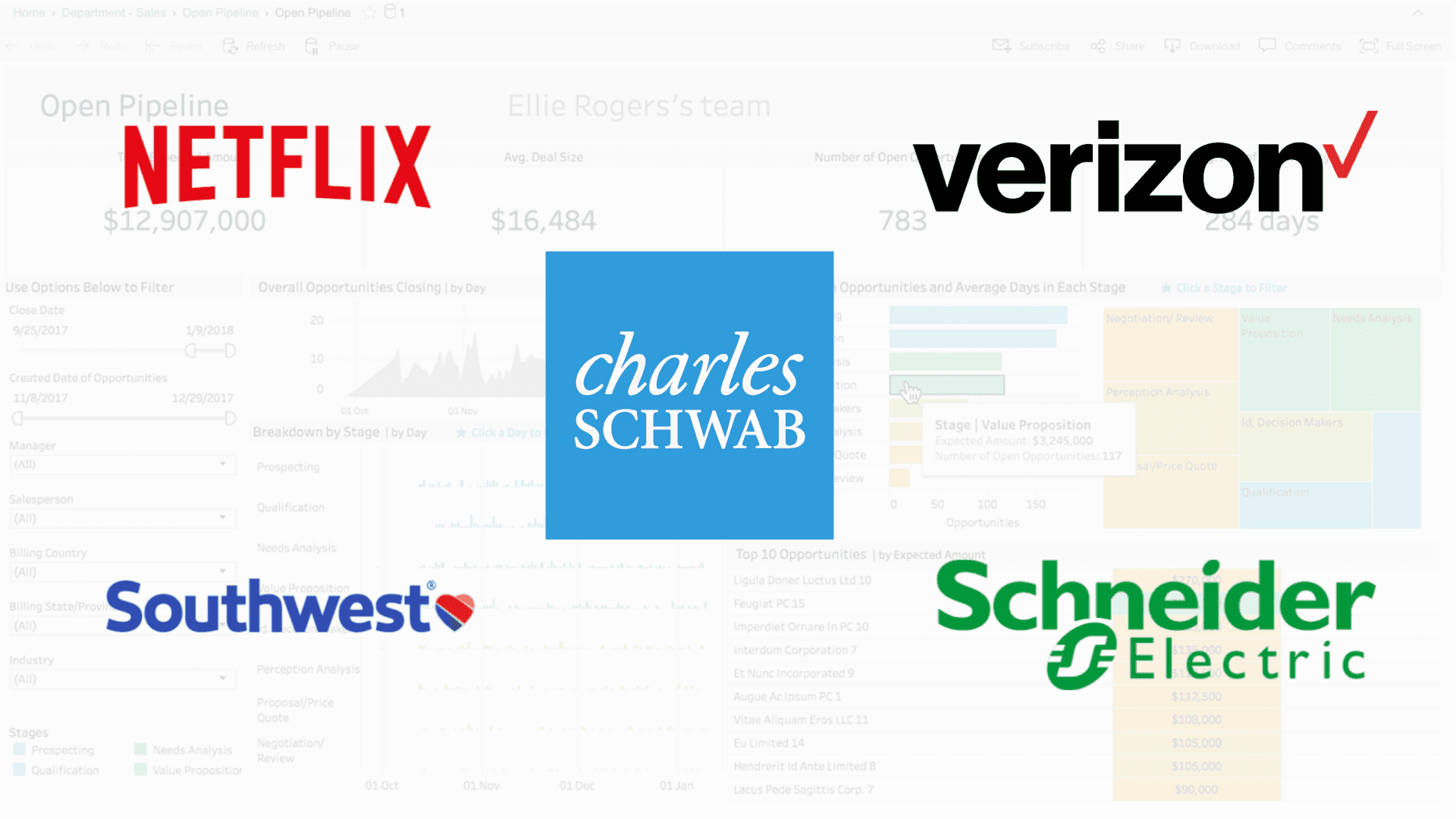4 pragmatic enablers of data-driven decision making
You could talk about what makes companies data-driven for hours. Fortunately, as a single picture is worth a thousand words, we can also use an…
Read more 
The two recently announced acquisitions by Google and Salesforce in the thriving business analytics market appear to be strategic moves to remain competitive in the BI tools segment against the branch leaders — Microsoft and Amazon.
The primary goal of both deals is to broaden both Google and Salesforce cloud businesses with well-known BI tools that also bring the value-added to the current set of tools and services in their portfolios. Currently, the Big Data analytics world is approaching the third wave of BI tools — the multi-scope, web-based data-platforms focusing on output reuse and understandable visualizations, which is what Looker does. This type of platform replaced the second-wave self-service tools like Tableau or RStudio using more standardised, grammatic-like approaches to data presentations making them less appealing, clear to audience. Upon Looker’s advantages we may include the fact that it is 100% web browser with web API, the tool provides flexibility and control on data definition thanks to LookML. Tableau, being a tool belonging to an older wave of BI does not have the above features, but offers Tableau Prep (a tool easing preparing the data) and provides more customisable visualisations. The above overview suggests that Looker acquisition was more future-oriented strategy step, but Tableau takeover has also other benefits for Salesforce.
 From the left: Frank Bien, CEO of Looker and Thomas Kurian, CEO of GCP.
From the left: Frank Bien, CEO of Looker and Thomas Kurian, CEO of GCP.Looker takeover deal by Google was announced on June 6th, 2019 and will be cash-settled for USD 2.6bn. This is USD 1bn above the latest Looker valuation that took place in December 2018. Google has a long standing relation with Looker. The tech company awarded Looker its Global Partner Award for Solution Innovation during Cloud Next in March 2017. Google’s investment arm, CapitalG, led an USD 81.5m investment round for Looker also in 2017. Considering the above, this year’s acquisition should not come as a surprise.
With the boosting cloud infrastructure market where Google Cloud Platform (GCP) holds 3rd position with c. 8% market share after Amazon Web Services (AWS) and Microsoft Azure. Looker will help Google to gain advantage over its competitors and provide its customers with a more complex analytics from business perspective and more appealing from design perspective solutions in order to support decision-making processes. Looker’s seems to be a perfect fit for GCP due to its great performance in cloud environment — it wouldn’t be surprising if Google at some point during leading an investment round suggested to lean towards cloud centric approach in Looker’s tool development while consulting on data infrastructure. Looker’s tool is expected to enlarge the GCP product portfolio with a great BI tool that most probably will replace its Google native equivalent, Google Data Studio and will be fully integrated with other GCP data tools. Looker is also expected to maintain the current licensing formula and cooperation ties (therefore be compatible) with Google’s cloud opponents, AWS and Azure what is in line with GCP’s commitment to the multi-cloud strategy. This step may be treated as a continuation of enlarging the partnership base by Google — recently, GCP announced the strategic partnership program with 7 open-source centric companies to port their products to the GCP ecosystem.
From the less IT centric perspective, growing the data analytics portfolio and sticking to multi-cloud approach is crucial for GCP’s strategy on the thriving Indian cloud computing market. Google wants to extend its Indian cloud sales force fivefold in the coming years to remain competitive to AWS, Azure and Alibaba.
From business management perspective, the takeover should bring synergy effects as Looker and Google shares over 350 customers including BuzzFeed, Yahoo and Hearst.
Tableau acquisition by Salesforce in an all-stock deal for USD 15.7bn was announced on June 10th, 2019 by Salesforce.com CEO, Marc Benioff.
With the constant expansion of Big Data analytics, Salesforce has been looking to extend the breadth of its business beyond CRM. In 2018 it has already purchased Mulesoft, a software integration open-source company. Purchasing Tableau, one of the industry leaders in BI seems to be the next step of extending business scope and an attempt to increase quality of CRM service by bringing more powerful insights from the already gathered data in customer-management fields of sales, marketing or customer retention and therefore attract more customers and grow business. The synergy of BI and CRM businesses may also deliver the advantages of the 3rd wave of BI industry, as Tableau may become more visual- and reuse-oriented tool. The acquisition makes sense as Salesforce is already growing its analytics unit being complement to CRM. The company is already present in BI having Salesforce Wave Analytics platform (SWA). SWA is a powerful tool in terms of computing power (faster 3–4 times than Tableau or Power BI as tool and databases are stored on the same servers) but has some weak spots because it only accepts data from Salesforce or as comma separated values files (.csv). Currently, Wave Analytics can be described more as an analytic module in Salesforce rather than a common analytic tool designed for all data sources. In such case, adding Tableau to its portfolio will broaden the scope of BI unit and bring value-added to the core CRM business. The most possible scenario is that Tableau will be fully integrated with Salesforce CRM platform on the software level and replace Wave Analytics but will be kept outside on the organizational level (it means no rebranding) due to high brand recognizability. This belief is backed by the fact that currently Salesforce.com is keeping Tableau’s Seattle headquarters, keeping Tableau CEO Alec Selipsky as head of the new Tableau business unit of salesforce.com and, seemingly, not restructuring the newly-acquired asset at all.
From business perspective the deal enlarges Salesforce’s business scale. Tableau brings more business from shared clients like Verizon, Charles Schwab, Schneider Electric, Netflix, and Southwest.
 These Salesforce and Tableau’s shared clients will benefit out of the new level of cooperation between the two tech companies.
These Salesforce and Tableau’s shared clients will benefit out of the new level of cooperation between the two tech companies.
From the financial perspective, the announced deal amount is probably incorrect and will be revised. The difference sums up to c. USD 1.3bn due to incorrect shares calculation for the deal valuation. According to the Forbes article, the miscalculation may negatively impact the whole deal and undermine its economic reasons and may suggest that the deal was slapped together as a response to Google’s acquisition of Looker.
From the IT perspective, those acquisitions mean more service consolidation and therefore more potential synergies. Top-tier cloud companies upon which we may include Google and Salesforce are attempting to expand their portfolio services to benefit from the synergies coming from pulling data from different sources together and attract more customers. The promising is Google strategy to implement multi-cloud approach and establish partnerships with open-source entities. This move will be appreciated by the customers and open-source community as more widely used open-source systems and tools (i.e. Kafka, Cassandra, Spark) will be compatible with GCP.
From the operational standpoint, it’s worth to analyze how Tableau and Looker’s operational aspect will look like after the acquisitions. Currently, the tools users’ are raising concerns about the quality of support lines in the coming months. By now, this aspect had good feedback, the issue responsiveness and amendment pipeline were well regarded, but will the service delivery remain on the same quality level considering GCP’s and Salesforce’s wide product portfolio?
These acquisitions may also suggest the upcoming change of BI industry in line with the predictive analytics trend. In the coming years, we may expect a shift in the general idea and purpose of using BI tools from learning what happened to learning what will happen next. Deriving such insights may be possible by mixing BI tools with ML & AI systems in which Google already has very good competences.
You could talk about what makes companies data-driven for hours. Fortunately, as a single picture is worth a thousand words, we can also use an…
Read moreIt has been almost a month since the 9th edition of the Big Data Technology Warsaw Summit. We were thrilled to have the opportunity to organize an…
Read moreOne of the main challenges of today's Machine Learning initiatives is the need for a centralized store of high-quality data that can be reused by Data…
Read moreHTTP Connector For Flink SQL In our projects at GetInData, we work a lot on scaling out our client's data engineering capabilities by enabling more…
Read moreA year is definitely a long enough time to see new trends or technologies that get more traction. The Big Data landscape changes increasingly fast…
Read moreThe client who needs Data Analytics Platform ING is a global bank with a European base, serving large corporations, multinationals and financial…
Read moreTogether, we will select the best Big Data solutions for your organization and build a project that will have a real impact on your organization.
What did you find most impressive about GetInData?